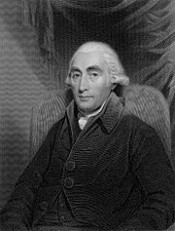Black Joseph

Joseph Black (16 April 1728 – 6 December 1799[1]) was a Scottish physician, known for his discoveries of latent heat, specific heat, and carbon dioxide. He was professor of Medicine at University of Glasgow (where he also served as lecturer in Chemistry). James Watt, who was appointed as philosophical instrument maker at the same university (1756), became involved in Black's works and conducted experiments on steam with Black. The chemistry buildings at both the University of Edinburgh and the University of Glasgow are named after Black. In about 1750, Joseph Black developed the analytical balance based on a light-weight beam balanced on a wedge-shaped fulcrum. Each arm carried a pan on which the sample or standard weights was placed. It far exceeded the accuracy of any other balance of the time and became an important scientific instrument in most chemistry laboratories.[2]. In 1757, he was appointed Regius Professor of the Practice of Medicine at the University of Glasgow. In 1761 Black deduced that the application of heat to ice does not cause its immediate liquefaction, rather the ice absorbed the heat without a rise in temperature.[3] Additionally, Black observed that the application of heat to boiling water does not result in immediate evaporation. From these observations, he concluded that the heat applied must have combined with the ice particles and boiling water and become latent. The theory of latent heat marks the beginning of thermal science.[4] Black's theory of latent heat was one of his more-important scientific contributions, and one on which his scientific fame chiefly rests. He also showed that different substances have different specific heats. This all proved important not only in the development of abstract science but in the development of the steam engine.[5]
do you like this author?
What readers are saying
What do you think? Write your own comment on this book!
write a commentWhat readers are saying
What do you think? Write your own comment on this author!
write a commentBook list

Experiments upon magnesia alba, Quicklime, and some other Alcaline Substances
Series:
Unknown
Year:
Unknown
Raiting:
2.5/5
This book was converted from its physical edition to the digital format by a community of volunteers. You may find it for free on the web. Purchase of the Kindle edition includes wireless delivery. --This text refers to the Kindle Edition edition.
Show more
add to favoritesadd In favorites
Book list

Experiments upon magnesia alba, Quicklime, and some other Alcaline Substances
Series:
Unknown
Year:
Unknown
Raiting:
2.5/5
This book was converted from its physical edition to the digital format by a community of volunteers. You may find it for free on the web. Purchase of the Kindle edition includes wireless delivery. --This text refers to the Kindle Edition edition.
Show more
add to favoritesadd In favorites
What readers are saying
What do you think? Write your own comment on this author!
write a commentGenre
if you like Black Joseph try:
readers also enjoyed
What readers are saying
What do you think? Write your own comment on this author!
write a commentGenre
if you like Black Joseph try:
readers also enjoyed
Do you want to exchange books? It’s EASY!
Get registered and find other users who want to give their favourite books to good hands!

